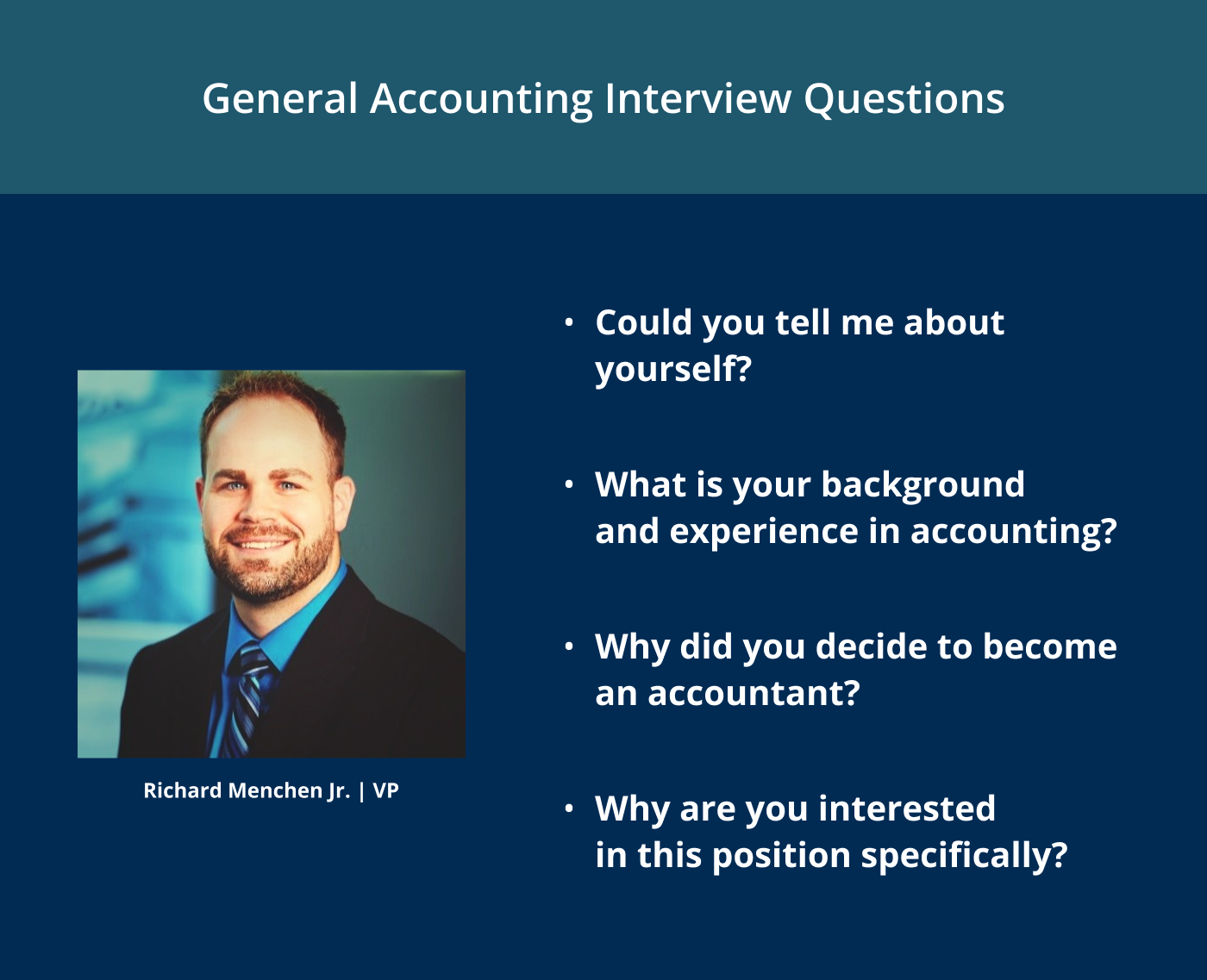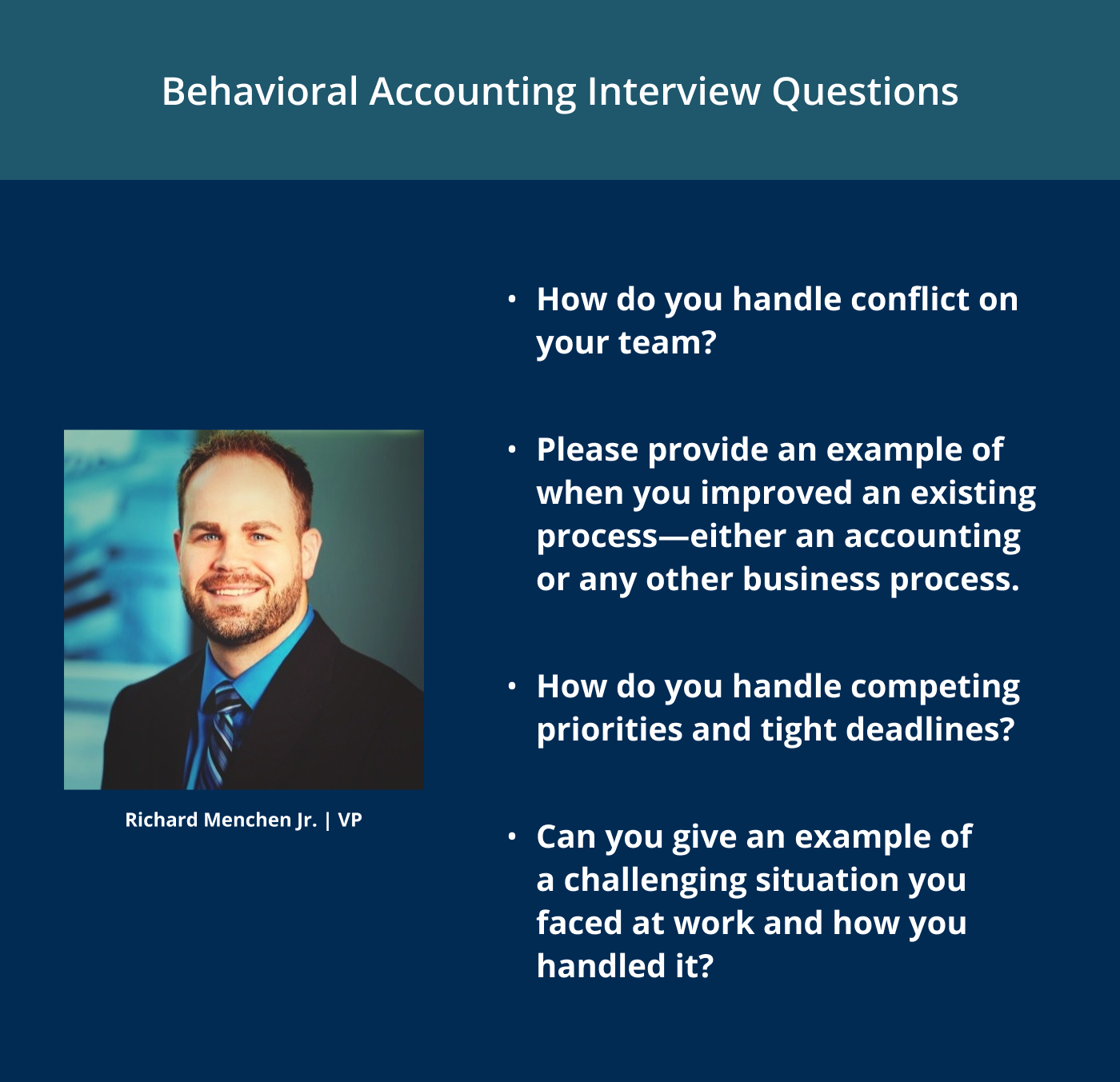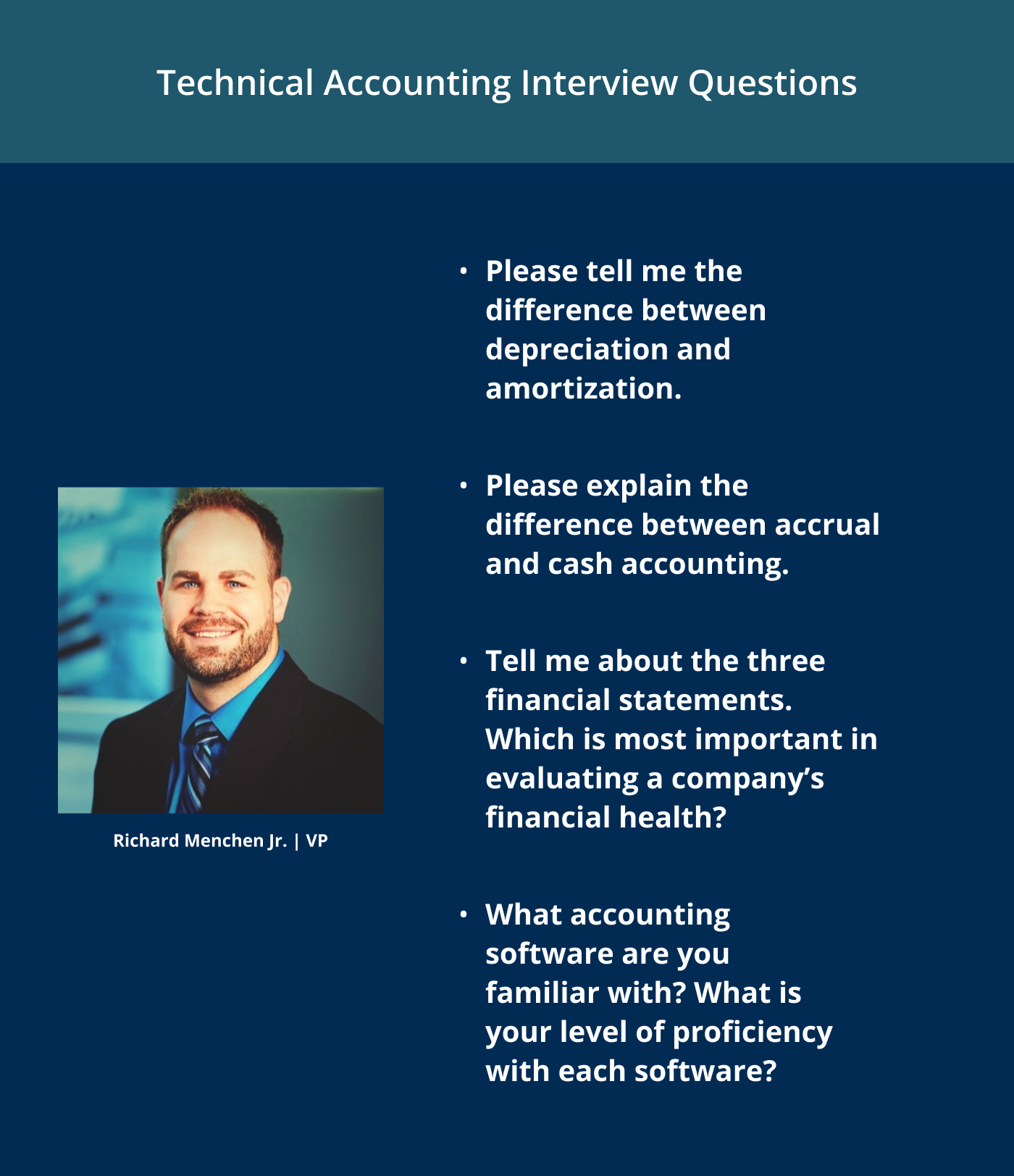
Accounting Interview Questions: Top Tips To Help You Prepare
Getting ready for a job interview can be stressful – especially when you’re in a field like accounting where technical questions are the norm. The process is even more challenging if you’re in the early stages of your career or transitioning into accounting. That’s why we’ve asked Richard Menchen, VP and operations controller for NetJets, a private aviation company, to share his insights into the interview process from the perspective of an experienced hiring manager. His experience and tips can help you understand what to expect and how to prepare for an accounting interview.
What Should You Expect from an Accounting Interview?
Accounting interviews are similar in many ways to most professional interviews. Your interviewer wants to get a sense of you as a person and professional, learn about your education and experience and evaluate your potential fit on their team. However, since accounting requires highly specialized knowledge, you should also expect questions that test your accounting knowledge and abilities.
Like most interviews, a standard accounting interview will open with introductions. Make a great first impression by preparing a brief introduction highlighting your education and experience. Most of your time with the interviewer will likely consist of questions and answers about your background, skills and scenarios you might face in the role. Finally, the closing portion of the interview offers you a chance to ask the interviewer any questions about the company and position.
What Are Common Accounting Interview Questions?
Going into an accounting interview, you can expect questions that fall into three main categories – general interview questions about your background and goals, technical accounting questions and behavioral questions related to your work style and collaborative ability. While the specific questions you’re asked will vary by role and industry, understanding the types of questions that might arise can help you avoid getting caught off guard. Find the questions Menchen most often asks entry- and mid-level accountants below.
General Accounting Interview Questions
If you’ve interviewed for professional positions before, some of the questions you’ll encounter in an accounting interview may seem familiar. These general queries are primarily aimed at getting a sense of your education, experience and plans for your career. Common questions include:
- Could you tell me about yourself?
- What is your background and experience in accounting?
- Why did you decide to become an accountant?
- Why are you interested in this position specifically?

Technical Accounting Interview Questions
Though the specific technical accounting questions you encounter will vary based on position and industry, you can expect to be asked about core accounting concepts in most interviews. Remember, the interviewer is interested in both your knowledge and your ability to explain ideas effectively and concisely. According to Menchen, questions might include:
- Please tell me the difference between depreciation and amortization.
- Please explain the difference between accrual and cash accounting.
- Tell me about the three financial statements. Which is most important in evaluating a company’s financial health?
- What accounting software are you familiar with? What is your level of proficiency with each software?
Ready to make your move in accounting? Gain insights for every career stage in our free Accounting Career Guide.

Behavioral Accounting Interview Questions
The behavioral questions you’re asked in an accounting interview are likely to be similar to those you might encounter in other fields. By asking these types of questions, the interviewer is trying to assess what you’ll be like as a team member and how your personal work style will fit within the company. Behavioral questions include:
- How do you handle conflict on your team?
- Please provide an example of when you improved an existing process—either an accounting or any other business process.
- How do you handle competing priorities and tight deadlines?
- Can you give an example of a challenging situation you faced at work and how you handled it?

How Should You Prepare for an Accounting Interview?
It’s impossible to predict everything that might come up during a job interview, but you can set yourself up for success by putting in the time to prepare beforehand. Key steps to prepare include the following.
- Ensure your online profile is up to date and aligned with the résumé you submitted when you applied for the position.
- Research the organization and its financials and be prepared to explain why you wish to work there.
- Practice your “elevator pitch” – a brief introduction to yourself and your experience.
- Save emails or other “kudos” from previous jobs and reference those when preparing for the interview. It can be helpful to bring them along to share with the interviewer.
- Get ready for behavioral questions by thinking back to your previous jobs. Prepare specific examples related to your experience, accomplishments and professional challenges you’ve overcome.
- Be ready to describe your career goals and aspirations.
Even if it feels awkward, practicing introducing yourself and answering common questions before the interview is always wise. Ask a friend or family member to help, or take advantage of any career resources your college or university may provide. If all else fails, talk to yourself in the mirror!
How Should You Prepare for Technical Accounting Interview Questions?
The specific technical questions you encounter will vary depending on the role you’re interviewing for. Still, reviewing core accounting concepts like financial statements, accrual and depreciation is always a good idea. If you are interviewing for an accounting position in a specialized industry, refresh your knowledge of that field and think about the financial concerns your target company may face.
Another critical step is to review the job description carefully. It likely specifies the role’s core tasks and mentions specific skills and software. Review those areas to ensure you’re fresh and ready to demonstrate your capabilities. If the position involves software or functions that you haven’t used before, be honest about your experience – but be prepared to show your interviewer that you have a basic understanding of what the tool is used for and that you have a plan to fill in any skill gaps.
What Questions Should a Candidate Ask in an Accounting Interview?
Interviews are a two-way street. Your interviewer is trying to determine whether you’re a good fit for the role and the company, but it’s also an opportunity for you to assess whether the role is the right fit for you as a person. That’s why you should always take the opportunity to ask questions in your interview. Potential queries for the hiring manager include the following.
- What does a typical workday/month look like?
- What types of opportunities are available for growth and development?
- What are the most challenging aspects of this role?
- What does success in this position look like?
- What is the workplace culture like? Is it collaborative?
Even if you feel confident that you understand what the role will entail, it’s generally wise to ask at least one question to demonstrate to the interviewer that you are engaged and interested in the company.
How to Stand Out in an Accounting Interview
According to Menchen, standout applicants for accounting roles can demonstrate relevant experience and knowledge and show an ongoing commitment to career development and advancement. Certifications like a CPA can be a significant value-add for certain positions, particularly those that are more technical or research-focused.
Menchen also looks for candidates who demonstrate “soft skills” in interviews. Small things like making good eye contact with the interviewer, rather than looking down or around the room, can make a huge difference. Be polished and timely, and show your interviewer you’re enthusiastic about the company and the role.
“Don’t be afraid to talk about yourself,” said Menchen. “Identify skills or traits that you are good at and be sure to highlight those attributes in the interview.”
After the conversation ends, follow up by sending a thank you email or note. If you spoke with more than one person, send each interviewer a personalized note. Even in today’s fast-paced world, this gesture still holds significant weight for many hiring managers.
Prepare for a Career in Accounting
If you’re ready to advance your career in accounting, Franklin University’s master’s degree programs may be right for you.
The M.S. in Accounting - Financial Operations Focus and M.S. in Accounting - Taxation Focus each offer theory-to-practice curricula taught by experienced practitioners. Both degrees are delivered 100% online and can be completed in as few as 17 months, allowing you to study without interrupting your professional life. Plus, earning a master’s degree will give you the required hours and foundational knowledge needed to sit for professional accounting certification exams, such as the Certified Public Accountant (CPA) designation.
Learn how a Franklin University master’s degree in accounting can help you build your future.





